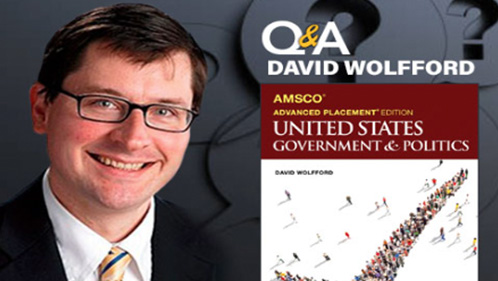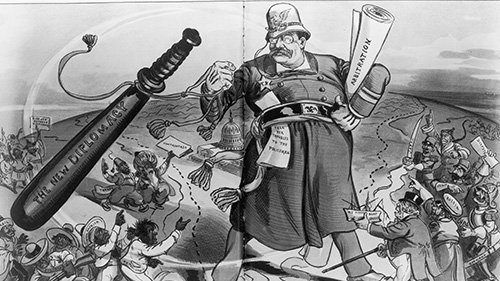Get to Know Joseph Bianchi, AP® Social Studies Editor
Get to know one of our editors, Joseph Bianchi, who specializes in AP® Social Studies. Joe answers our questions about how he carries over his 25...
AP & Honors Mathematics
Explore Wiley titles to support both AP and Honors mathematics instruction.
Literacy Skills & Intensive Reading
Connections: Reading – Grades 6–12
Empower student success with a proven intensive reading program that develops strong reading skills in striving readers.
Drama, Speech & Debate
Basic Drama Projects 10th Edition
Build students’ confidence and competence with comprehensive, project-based theatre instruction.
Literature
Connections: Literature
Support learners as they study dynamic, relevant texts and bring the richness of diverse voices to students through literature.
Literature & Thought
Develop critical thinking, reading, and writing across literacy themes, genres, historical eras, and current events.
Language Arts
Vocabu-Lit® – Grades 6–12
Help students build word power using high-quality contemporary and classic literature, nonfiction, essays, and more.
Connections: Writing & Language
Help students develop grammar, usage, mechanics, vocabulary, spelling, and writing and editing skills.
Reading/English Language Arts
Measuring Up to the English Language Arts Standards
Incorporate standards-driven teaching strategies to complement your ELA curriculum.
English Language Learners
Measuring Up for English Language Learners
Incorporate research-based best practices for ELLs with an approach that includes a focus on language acquisition strategies.
Mathematics
Measuring Up to the Mathematics Standards
Incorporate standards-driven teaching strategies to complement your mathematics curriculum.
Foundations
Measuring Up Foundations
Help students master foundational math skills that are critical for students to find academic success.
Science
Measuring Up to the Next Generation Science Standards
Give students comprehensive NGSS coverage while targeting instruction and providing rigorous standards practice.
Assessment
Measuring Up Live
Deliver innovative assessment and practice technology designed to offer data-driven instructional support.
For a better website experience, please confirm you are in:
2 min read
Perfection Learning Jun 17, 2021 11:17:54 AM

Get to know the author of our AP® United States Government & Politics textbook. David Wolfford answers our questions about how he maintains his love of teaching AP® Government, his tricks for memorizing student names, and his #1 classroom rule!
What is your most creative online teaching story from the past nine months?
I quickly learned last spring that students in a remote setting appreciate when their teacher’s personality can make it through cyberspace. So, I created a video in my kitchen, clad in an apron, where I explained the “recipe” for the AP® Government argumentative Free-Response Question (FRQ). I put large visible labels on several spice containers, like “argument” and “reasoning,” to represent the parts/elements of the essay. I could sort of predict from the online buzz that more students would complete the assignment, which they ultimately did. So I found such antics practical.
How do you remember all of your students’ names? Any tips or tricks?
My memory for student names is not bad, but I more frequently use last names. That way, you avoid calling the younger sibling the names of their older brother or sister. This year I have eight pairs of twins (16 kids) in a senior class of about 120. The last name approach has never been more useful!
Is there a quote or saying that you live your life by?
“Believe about half of what you see and none of what you hear.” – Ben Franklin
How do you maintain your passion for teaching AP® Government & Politics?
It seems easy to maintain this passion. I am now in my 25th year of teaching, and 19th straight year teaching Government. It never gets old. The relevance of current events keeps me going. New books, films, and other sources just keep coming. I am also a newshound.
What is your #1 classroom rule?
No phones. Period.
Who or what influenced you to become a writer?
During my first semester of graduate school at the University of Kentucky, one of my History professors asked me if I planned to submit my research paper to the state history journal—which I didn’t even know about. His question both stunned and inspired me. The professor did a massive edit job with me, taught me a lot about writing, and it became my first publication. It is amazing how influential such a comment and encouragement can be.
Watch David speak about writing the AP® US Government & Politics book and what makes it unique!
David Wolfford teaches Advanced Placement® U.S. Government and Politics at Mariemont High School in Cincinnati, Ohio, and has served as an AP® Reader. He has a B.A. in Secondary Education and an M.A. in Constitutional and Legal History, both from the University of Kentucky. He has conducted historical research projects on school desegregation and American political history. David has published in historical journals, such as Ohio Valley History and Kentucky Humanities. He has written on government, politics, and campaigns for national magazines and Cincinnati newspapers. He is a James Madison Fellow, a National Board-certified teacher, and a regular contributor to Social Education. David is editor of By George: Articles from the Ashland Daily Independent (Jesse Stuart Foundation) and editor of Ohio Social Studies Review.
Advanced Placement® is a trademark registered and/or owned by the College Board, which was not involved in the production of, and does not endorse, this product.

Get to know one of our editors, Joseph Bianchi, who specializes in AP® Social Studies. Joe answers our questions about how he carries over his 25...

One of the most critical skills students will need on the AP® United States Government Exam is data literacy. Not only will there always be a...

For many students, the most intimidating part of an AP® Social Studies exam isn’t the content—it’s the rubric.

One of the most vexing problems facing students and teachers alike is the teaching of Federalist #10. Federalist #10 and the issue of factions is...

From a practical point of view, argumentation is at the heart of the free response section of the AP exam. This can be particularly difficult with...

Though the College Board’s AP® United States Government and Politics FRQs #3 and #4 may be more involved and seem more challenging, FRQ #1 and #2 can...

AP® Psychology is just as much a class with an abundance of new vocabulary as it is an introduction into the field of psychology. Students often...

The Supreme Court of the United States is often seen as the most distant and befuddling branch for my students. Whether it is misunderstanding their...

Discover how simulations can enhance learning in AP® U.S. Government and Politics. Engage students with hands-on activities like discretionary...

The beginning of the school year is an important time for establishing expectations and forming relationships, both teacher-student and...

Many teachers consider the Document Based Question (DBQ) of the AP® European History Exam to be one of the more challenging aspects of the course....

Political cartoons have influenced the public and brought about change like other tools in the press. The historic 1754 cartoon of a sliced-up snake,...
